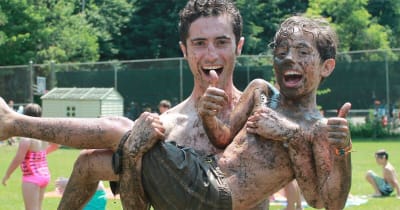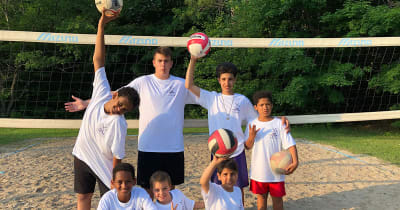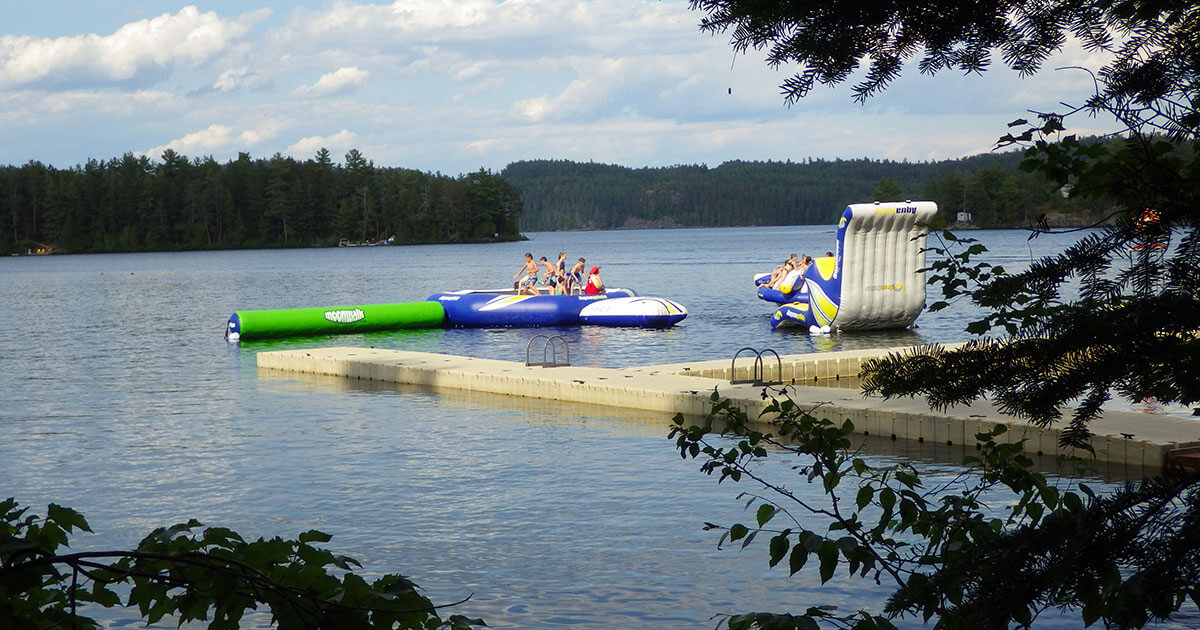What will you learn in a First Aid course?
Standard First Aid
Standard First Aid courses train students in the practice of recognizing and assisting a distressed individual. Kids and teens learn basic and effective practices for treating injuries of all kinds including chest, spinal, and bone injuries. A total of 13 emergency responses are illustrated, including treating psychological or traumatic distress post-emergency. This course also covers standard CPR training and, once completed, will result in a CPR-C certification.
Bronze Medallion
The Bronze Medallion course is a prerequisite for the Bronze Cross. Both of these teach then assess knowledge, skills, fitness, and judgment of First Aid students.
Knowledge. Students are required to demonstrate a knowledge of basic life-saving procedures in the water including multiple rescue processes and the drowning chain of survival. Students are challenged on their ability to recognize the dangers of cold water and the necessary precautions to take when saving someone in cold water temperatures.
Skills. Bronze Medallion training teaches basic rescue techniques to help drowning swimmers. Resuscitation techniques play a large role in this section of the course as students practice CPR techniques for infants, children, and adults, on a manikin. Each skill is a necessary prerequisite for the Bronze Cross, giving students the proper foundation for the development of future lifeguarding skills.
Fitness. During a rescue, lifesavers must be mentally as well as physically prepared to save a victim. Kids’ physicality is tested through swimming and self rescue exercises. Lifesavers must be strong enough to lift bodies and swim and tread water for long periods of time. Drills and endurance tests are employed during this section of training and students must be prepared to spend long hours in the water.
Judgment. Simulated rescues and risk assessment challenges are administered in this section. Kids are expected to identify possible hazards in and around the water as well as complete three sets of rescue challenges based on knowledge they’ve gained.
Bronze Cross
Like the Bronze Medallion course, Bronze Cross training is divided into the four same modules below. Bronze Cross training is the next step towards becoming an assistant lifeguard and is a requirement for kids wishing to pursue further lifeguard training.
Knowledge. More advanced life-saving instructions are provided during this course. By the end, students should be able to demonstrate their knowledge of treating non-fatal drowning victims, preventing shallow water blackout, as well as what’s expected in their future role as assistant lifeguards. Students also enhance responsiveness and communication skills during this section.
Skills. Since this course prepares students for assistant lifeguarding, Bronze Cross training has a larger focus on two-person rescue procedures. Skills learned include working alongside another lifeguard to save drowning victims through removal and resuscitation exercises. They’re also taught how to effectively and efficiently communicate with their partner, victim, and bystanders.
Fitness. Students’ physicality is perhaps the most important part of saving drowning victims. Bronze Cross training recognizes this, as its fitness exercises and challenges are enhanced from Bronze Medallion. Rescue drills, strength tests, and endurance exercises are administered by instructors and each one will be required during a recertification.
Judgment. As an accumulation of what students have learned over the course, the judgment section puts knowledge, skills, and fitness to the test. Kids will participate in two-person rescue drills that cover two different, common situations. This course also asks students to practice supervising a potentially hazardous area as well as common assistant-lifeguard situations. Observational skills, physical fitness, and responsiveness are required to be successful.
Leadership
Standard First Aid, Bronze Medallion, and Bronze Cross training all focus on turning students into better leaders. Courses elevate students’ responsibility, self-control, adaptability, and observational skills during high-pressure situations. Kids learn to increasingly embody the mentality of a natural leader.
The benefits of First Aid courses
Employment opportunities. Becoming certified in any First Aid course opens up opportunities beyond lifeguarding. Employers consistently look for employees who work well under pressure and can prove themselves useful during tense situations. Potential jobs for students include camp counseling or babysitting, but they can build on their First Aid training to assume leadership roles in any future work environment.
Preparation for the future. First responders, frontline workers, doctors, and other medical professionals are indispensable. These workers are constantly plunged into intense situations that test their mental and physical health. First Aid and the Bronze Medallion or Cross training allows students to reflect on and identify how they might be fit for these challenging and financially rewarding lines of work.
Increases responsibility and maturity. Strong leaders quickly respond to high pressure, and problem-solve effectively. Students in First Aid courses develop these traits when they face challenges or exercises that simulate real life situations.
Camps and programs related to First Aid courses
First Aid training can pique kids’ and teens’ interest in medical science and related careers, and can steer them in the direction of highly responsible careers. Here’s a look at camps that could be a logical next or lateral step after taking a First Aid course.
Leadership camps are an ideal next step for teens who want to embrace their own maturation to deeper personal development and increased responsibility.
Swimming camps on OurKids.net teach everything from basic lessons emphasizing water safety, to aquatic leadership in the pool. See also swimming lessons.
Science camp for kids and teens, often hosted by science centers or museums, etc., offers an immersion in science and the natural world. These come in a wide variety like medical science camps, marine biology camps, and zoology camp.
STEAM camp, STEM camp, and both STEM and STEAM after school classes can also be a natural fit for kids and teens developing their interest in medical and related sciences.
Consult more information in the rest of our guide:
Sources and further reading
Bronze Cross. LifesavingSociety.com
Bronze Medallion. Lifesaving Society.com
Standard First Aid. LifesavingSociety.com
“Drowning chain.” Wikipedia.org
Frequently Asked Questions
How many First Aid courses for teens and kids are there?
There are 3 programs offering first-aid/lifesaving as an activity. Use the filters to narrow by age and program type, then click on matched programs to see daily activities, dates, rates and registration information.
What are the fees to attend First Aid courses for teens and kids?
Fees for programs offering first-aid/lifesaving as an activity range from $245 to $990 per program (program types and lengths vary). Use the filters here to narrow programs by age and type.
Where can parents meet with First Aid courses for teens and kids?
Meet with program directors and staff at the Our Kids Camp & Program Expo. The Expo is held annually in February, and is a fun and informative day for parents, kids, and teens. Find event details and free tickets here.







